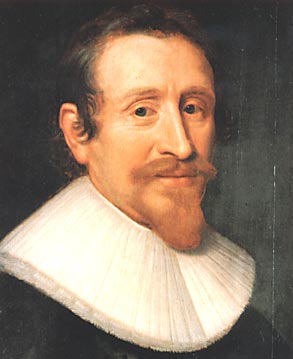- Born on April 10, 1583
- Deft, Holland

- Worked as a jurist in the Dutch republic
- Laid the foundations for the international law
- With Francisco de Vitoria and Alberico Gentili
- Philosopher, Theologian, Christian apologist, Playwright and Poet
- Key works: Mare Liberum and De Jure Belli ac Pacis
Early Life
- Born in Deft, Holland
- First child
- Jan de Groot and Alida van Overschie
- Groomed at early age in a traditional humanist and Aristotelian education
- Entered University of Leiden
- He was 11 years old
- Earned an appointment as advocate in 1599
To The Hague
- Third largest city in Netherlands
- Seat of the Dutch parliament, government, and royal court
- Became official historiographer
- For the states of Holland in 1601
- Wrote about the issues of international justice in 1604
Natural Law
- A perspective judgment where things can be considered good or bad according to their own nature
- Hypothetical argument:
- Natural Law is still valid if God does not exist or if God is not interested in human affairs
- Believed that God was no longer the only source of ethical qualities
Key Works
- Mare Liberum
- Translated as The Free Sea
- Formulated a principle
- Sea was international territory
- All nations are free to use it for sea surfing trade
- Provided ideological justification for the Dutch to break up various trade monopolies
- Argued that freedom of sea is key aspect in communications between people and nations
- Believed that ruling over the sea is against natural law
- War is violating Natural Law
- But necessary
- Produced Just War doctrine
- Jus ad bellum
- Rightful causes of war
- Jus in bello
- Rightful conduct of war
- If nation wants to enter war
- Ensure that purpose of war = obtain rights
- War is the last resort when conciliation failed
- Religious war is unjust
- Religion is inner conviction
Conference and negotiations
- Concessions
- Single combat/Choosing by lot
- Moral conducts during war
- Protect non combatant
- Treat hostages and prisoners humanly
- Protect property from destruction
- Recognized sovereign states as basic units of international law
- Law of nations have more extensive rights
- Authority from all, if not, many nations
- Grotius’ personal motto was:
- “Ruit Hora” which means “Time is running away”
- Last words were:
- “By understanding many things, I have accomplished nothing.”
